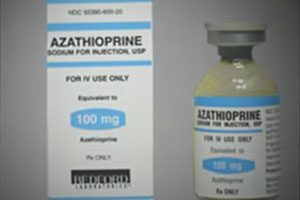
TNF Blockers May Cause HSTCL. Lawyers at our firm who are involved in defective drug litigation are investigating cases of a rare blood cancer seen in teenagers and young adults treated with drugs known as tumor necrosis factors (TNF) blockers, as well as with azathioprine, and/or mercaptopurin. This aggressive and usually fatal cancer, called Hepatosplenic […]

TNF Blockers May Cause HSTCL. Lawyers at our firm who are involved in defective drug litigation are investigating cases of a rare blood cancer seen in teenagers and young adults treated with drugs known as tumor necrosis factors (TNF) blockers, as well as with azathioprine, and/or mercaptopurin. This aggressive and usually fatal cancer, called Hepatosplenic T-Cell Lymphoma (HSTCL), has been seen mainly in teenagers and young adults who received these drugs, either alone or in combination, to treat Crohn’s disease and ulcerative colitis. TNF blockers include Remicade (infliximab), Enbrel (etancercept), Humira (adalimumab), Cimzia (certolizumab pegol) and Simponi (golimumab).
If you or someone you know was diagnosed with HSTCL during treatment that involved TNF blockers, azathioprine, and/or mercaptopurin, our defective drug lawyers want to hear from you. We are currently offering free case evaluations to all victims of HSTCL that may be associated with these drugs. Please contact our office today to protect your legal rights.
The TNF blockers Remicade, Enbrel, Humira, Cimzia and Simponi suppress the immune system by blocking the activity of TNF, a substance in the body that can cause inflammation and lead to immune-system diseases, such as Crohn’s disease, ulcerative colitis, rheumatoid arthritis, ankylosing spondylitis, psoriatic arthritis and plaque psoriasis.
Azathioprine and mercaptopurin also suppress the immune system. They are commonly used as part of a combination regimen or used alone to treat Crohn’s disease and ulcerative colitis, although they are not approved for those uses.
On April 14, 2011, the U.S. Food & Drug Administration (FDA) issued a Drug Safety Communication to inform the public that it was continuing to receive reports of HSTCL in teenagers and young people treated for Crohn’s disease and ulcerative colitis with TNF blockers, as well as with azathioprine, and/or mercaptopurin. HSTCL is an aggressive (fast-growing) cancer and is usually fatal. The majority of HSTCL cases reported were in patients being treated for Crohn’s disease or ulcerative colitis, but also included a patient being treated for psoriasis and two patients being treated for rheumatoid arthritis, the FDA said.
According to the agency’s Data Summary, as of December 31, 2010, more than 40 HSTCL cases have been identified in the Adverse Event Reporting System (AERS) database, the medical literature, and the HSTCL Cancer Survivors’ Network. Twenty of these cases were associated with Remicade. Of the others, one was associated with Enbrel, two with Humira, five with Remicade / Humira, 12 with azathioprine, and three with mercaptopurine. The FDA noted that in the 20 cases identified with Remicade, 18 of the patients also were known to be using concomitant mercaptopurine or azathioprine. Of the five cases identified with Remicade / Humira use, 4 patients were known to be using concomitant mercaptopurine or azathioprine.
The FDA previously communicated about the increased risk of lymphomas and other cancers associated with the use of TNF blockers in children and adolescents in June 2008. It did so again in August 2009 when new warnings were added to the TNF blocker labels. In its April 2011 Drug Safety Communication, the FDA said the product labels for Remicade and Humira have been updated to include warnings about HSTCL. The product labels for azathioprine and mercaptopurine would also be updated to include HSTCL warnings, the FDA said.
The personal injury attorneys at Parker Waichman LLP offer free, no-obligation case evaluations. For more information, fill out our online contact form or call 1-800-YOURLAWYER (1-800-968-7529).
Our lawyers for Azathioprine side effects for Azathioprine side effects are here to help you when you need it the most.


